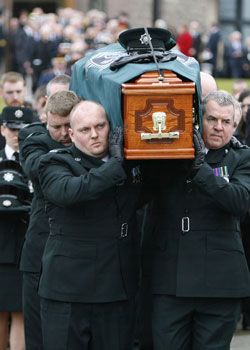Northern Ireland has once more hit the headlines. It is not because the political settlement to a 30-year conflict which was supposedly ended by the Good Friday Agreement is working well. It is not because the implacable enemies of yesteryear -- the Republicans who want to separate from the United Kingdom and the Loyalists who want to maintain the status quo are living in what appears to be an eternal political embrace.
Northern Ireland is in the headlines again because terrorist killings have returned to threaten the peace and unity that the Good Friday Agreement brought to a long-fractured part of the United Kingdom.
The killings of two British soldiers and the shooting of a policeman within two days have once more raised the spectre of terrorism that had long haunted Northern Ireland and spurred some-perhaps rather hastily-to ask whether the 10-year-old agreement is beginning to unravel.
Two dissident groups of the Irish Republican Army (IRA) -- the Real IRA (RIRA) and the Continuity IRA (CIRA) - have claimed responsibility for the killings, something that our own LTTE would rarely, if ever, do.
 |
| A coffin containing the body of Northern Irish police Constable Stephen Carroll is carried by colleagues after a church service in Banbridge, Northern Ireland, on March 13, 2009. Northern Ireland grieved Friday for the first policeman killed here for a decade, after his widow called for an end to violence threatening the province's peace process. AFP |
Sri Lankans have seen enough terrorism and terrorist killings and have their own problems to have been overly concerned about what is now happening in some distant part of the UK.
But the significance of developments in Northern Ireland cannot be easily dismissed as irrelevant because the Good Friday Agreement and the subsequent political settlement have been constantly held before us as the exemplar of conflict resolution and that Sri Lanka too should emulate the process or at least one similar , if we are to end our own problem.
In fact two persons who were intimately connected with the Northern Ireland problem -- Martin McGuinness, once a leading member of the IRA and Paul Murphy, a former Northern Ireland Minister -- both visited Sri Lanka at various times to advice Colombo on how a political settlement was achieved and to give of their experience in bringing an end to the Northern Ireland troubles hoping it would help Sri Lanka resolve its own conflict.
In the British parliament critics of the Sri Lanka government have oft urged it to follow the path of negotiations taken by the Northern Ireland peace agreement and engage the LTTE in political discussions to stop the conflict.
It seems now, despite all the hoopla that accompanied the signing of the agreement and more so when under then Prime Minister Tony Blair's persistence old enemies decided to lie together and serve in the same government in Stormont, that the process of making peace had not been stitched together with sufficient care and now the pieces are beginning to show signs of wear.
How often did one hear in the British parliament apologists for the LTTE call on Sri Lanka to emulate the Northern Ireland experience and engage the LTTE in negotiation?
They, in particular, would dismiss the recent killings as an aberration, that such isolated incidents are to be expected in a part of the world where the gun once ruled the day.
Two things are wrong with this argument. Firstly this is not an isolated happening as some would wish us to believe. Since the beginning of last year dissident groups that still carry arms and have rejected the political settlement as a sell out of the Irish Catholics have carried out at least 18 gun and bomb attacks, albeit with varying success.
A recent report of the Independent Monitoring Commission (IMC) established by the British and Irish governments and mandated to study and report on paramilitary activities said that the RIRA has continued to "enhance its organizational capacity." But it dismissed this claiming that police on both sides of the border have been successful in disrupting the dissident operations and arresting suspects.
It appears that the optimism of the IMC is not shared by senior police officers who had warned even before the latest round of violence that the peace process was under threat.
That is probably why Sir Hugh Orde, Northern Ireland's police chief ordered the deployment of the Armed Forces Special Reconnaissance Regiment (SSR). Such an elite force formed four years back to fight international terrorism would hardly have been ordered to the area unless the threat perception from dissident terrorist groups was judged as significant.
Even if the peace settlement is not dangerously undermined, one needs to question those who advance the case of the Northern Ireland peace process as relevant to Sri Lanka.
Those who pressure Sri Lanka to call a ceasefire and talk to the LTTE citing the Good Friday Agreement as one worthy of emulation are either trying to mislead the Sri Lankan people or conveniently forgetful.
There were two critical issues in those negotiations that are relevant to our case. One is that the Northern Ireland talks involved all parties to the conflict or had an interest in it. It did not only involve the IRA through its political arm Sinn Fein which anyway did not claim to be the sole representative of the republicans.
Moreover the Good Friday Agreement called for the decommissioning of all weapons by the IRA and paramilitary groups, which, in effect, meant surrender, during the process of negotiation.
Some would urge Sri Lanka to talk to the LTTE on the understanding that they would undertake to surrender their weapons when a successful conclusion is reached.
History has taught successive governments the folly of placing any faith in such assurances.
If it is the Good Friday Agreement that is waved at Sri Lanka, well and good. But then follow it in letter and spirit.
|

